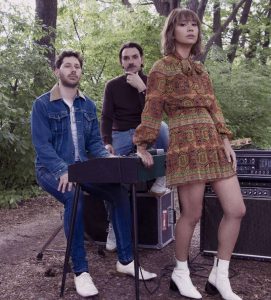 They’re the perfect counter-example to Rock et Belles Oreilles’ old hit “I Want to Pogne,” in which the five comedians made fun of Quebecers who sang in English to try and be more popular. With their vaguely tropical nu-disco sound and serious lyrics, Le Couleur’s popularity spills over even the invisible boundaries of the Francophonie.
They’re the perfect counter-example to Rock et Belles Oreilles’ old hit “I Want to Pogne,” in which the five comedians made fun of Quebecers who sang in English to try and be more popular. With their vaguely tropical nu-disco sound and serious lyrics, Le Couleur’s popularity spills over even the invisible boundaries of the Francophonie.
The band has been doing its own thing for over a decade, far from the folk and pop-rock that still dominate the ADISQ Awards. They have much more in common with Patsy Gallant or Toulouse than with bands like Karkwa or Galaxie.
On the margins of the main trends in Montréal, they’re perfectly in sync with the trends in Pigalle or Brooklyn. The band, fronted by Laurence Giroux-Do, is an international hit and they’ve made their way into a Netflix series soundtrack (Emily in Paris), and even onto the glossy pages of Playboy Mexico. And those are but two of a long list of surprising engagements that confirm the growing interest they generate abroad.
They were planning on reaping the benefits of their Spotify stats outside of Canada before the pandemic clipped their wings and paralyzed the live entertainment industry. “Our record launch was planned for April 18 and when this happened, we weren’t sure how true it was,” says singer-songwriter Giroux-Do. “We were supposed to play South by Southwest on March 8, followed by about 15 dates in the U.S. Everything was cancelled… We work with this incredible booker in South America, and we were also supposed to tour in Brazil, Mexico and Chile…”
In the end, Concorde, the successor to 2017’s P.O.P., which made it on the Polaris long list, was pressed on vinyl and released online this fall.
Released on Sept. 11, a date that will forever be linked to the 2001 terrorist attacks, Concorde seems to take on a slightly morbid twist because of that, and because it is rooted in the crash of its namesake plane in 2000. The words, written and sung by Giroux-Do, are in stark contrast to the cheerful and engaging way Steeven Chouinard keeps the tempo. Their secret recipe was inspired by the greatest electro-pop masters who defined the genre almost half a century ago.
“ABBA – they became gazillionaires, while being quite dark in their formula and lyrics, set to very dance-y music,” says Chouinard, the band’s percussionist, co-writer, and producer. “ABBA’s a huge influence for us, but not consciously. It really is at the unconscious level. But to be honest, when people compare us to them, it’s an amazing compliment.”
Opening with a verbatim transcript of the last words of the plane’s pilot to the control tower, a sinister exchange played by two actors with Parisian accents, the last chorus of the title song feels like an echo from beyond the grave. Indeed, Giroux-Do dug deep into the many documentaries on the Air France tragedy before she started putting pen to paper. “Yet, it kind flies under the radar because the funky groove behind it,” she says.
The three original band members have changed their game plan, while they’re parked on the tarmac, waiting to resume their take-off, alongside their new crew of four musicians. “The U.S. no longer exists for us, until there’s a vaccine,” Giroux-Do explains. “All our bookers have told us to forget about Europe too, at least for 2021, because bigger names and local artists will be favoured.”
Motivated by the promise of a return to normalcy, the Montréalers will focus on developing a market they’ve neglected up to now. “We’ve played New York City, like, four or five times, but we’ve never played in Lac-Saint-Jean, Trois-Rivières, or Gatineau. It’s time to change that,” says Chouinard, laughing.
Their music will travel for them, while they wait to be able to return to those exotic destinations far beyond the Laurentides Wildlife Reserve.